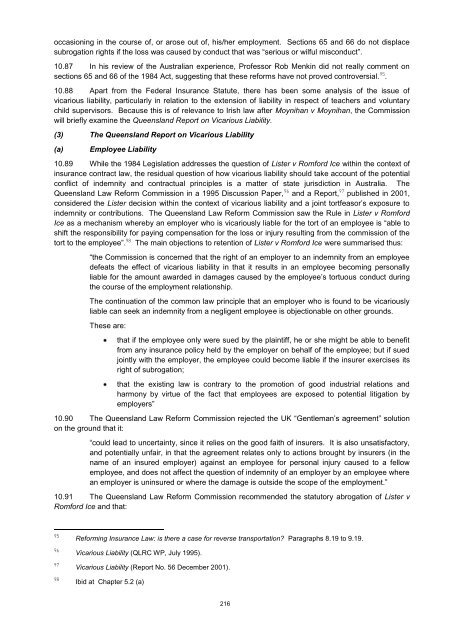Insurance Contracts CP - Law Reform Commission
Insurance Contracts CP - Law Reform Commission
Insurance Contracts CP - Law Reform Commission
Create successful ePaper yourself
Turn your PDF publications into a flip-book with our unique Google optimized e-Paper software.
occasioning in the course of, or arose out of, his/her employment. Sections 65 and 66 do not displace<br />
subrogation rights if the loss was caused by conduct that was ―serious or wilful misconduct‖.<br />
10.87 In his review of the Australian experience, Professor Rob Menkin did not really comment on<br />
sections 65 and 66 of the 1984 Act, suggesting that these reforms have not proved controversial. 95 .<br />
10.88 Apart from the Federal <strong>Insurance</strong> Statute, there has been some analysis of the issue of<br />
vicarious liability, particularly in relation to the extension of liability in respect of teachers and voluntary<br />
child supervisors. Because this is of relevance to Irish law after Moynihan v Moynihan, the <strong>Commission</strong><br />
will briefly examine the Queensland Report on Vicarious Liability.<br />
(3) The Queensland Report on Vicarious Liability<br />
(a)<br />
Employee Liability<br />
10.89 While the 1984 Legislation addresses the question of Lister v Romford Ice within the context of<br />
insurance contract law, the residual question of how vicarious liability should take account of the potential<br />
conflict of indemnity and contractual principles is a matter of state jurisdiction in Australia. The<br />
Queensland <strong>Law</strong> <strong>Reform</strong> <strong>Commission</strong> in a 1995 Discussion Paper, 96 and a Report, 97 published in 2001,<br />
considered the Lister decision within the context of vicarious liability and a joint tortfeasor‘s exposure to<br />
indemnity or contributions. The Queensland <strong>Law</strong> <strong>Reform</strong> <strong>Commission</strong> saw the Rule in Lister v Romford<br />
Ice as a mechanism whereby an employer who is vicariously liable for the tort of an employee is ―able to<br />
shift the responsibility for paying compensation for the loss or injury resulting from the commission of the<br />
tort to the employee‖. 98 The main objections to retention of Lister v Romford Ice were summarised thus:<br />
―the <strong>Commission</strong> is concerned that the right of an employer to an indemnity from an employee<br />
defeats the effect of vicarious liability in that it results in an employee becoming personally<br />
liable for the amount awarded in damages caused by the employee‘s tortuous conduct during<br />
the course of the employment relationship.<br />
The continuation of the common law principle that an employer who is found to be vicariously<br />
liable can seek an indemnity from a negligent employee is objectionable on other grounds.<br />
These are:<br />
that if the employee only were sued by the plaintiff, he or she might be able to benefit<br />
from any insurance policy held by the employer on behalf of the employee; but if sued<br />
jointly with the employer, the employee could become liable if the insurer exercises its<br />
right of subrogation;<br />
that the existing law is contrary to the promotion of good industrial relations and<br />
harmony by virtue of the fact that employees are exposed to potential litigation by<br />
employers‖<br />
10.90 The Queensland <strong>Law</strong> <strong>Reform</strong> <strong>Commission</strong> rejected the UK ―Gentleman‘s agreement‖ solution<br />
on the ground that it:<br />
―could lead to uncertainty, since it relies on the good faith of insurers. It is also unsatisfactory,<br />
and potentially unfair, in that the agreement relates only to actions brought by insurers (in the<br />
name of an insured employer) against an employee for personal injury caused to a fellow<br />
employee, and does not affect the question of indemnity of an employer by an employee where<br />
an employer is uninsured or where the damage is outside the scope of the employment.‖<br />
10.91 The Queensland <strong>Law</strong> <strong>Reform</strong> <strong>Commission</strong> recommended the statutory abrogation of Lister v<br />
Romford Ice and that:<br />
95<br />
96<br />
97<br />
98<br />
<strong>Reform</strong>ing <strong>Insurance</strong> <strong>Law</strong>: is there a case for reverse transportation? Paragraphs 8.19 to 9.19.<br />
Vicarious Liability (QLRC WP, July 1995).<br />
Vicarious Liability (Report No. 56 December 2001).<br />
Ibid at Chapter 5.2 (a)<br />
216

















